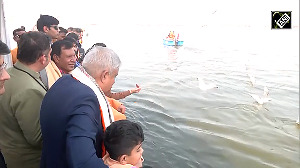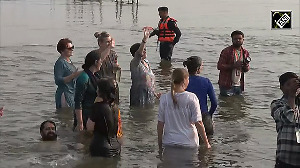'When I started to step into the West in 2006, I believed India was not going to be the back end.'
'I understood that no film-maker wants to believe that they are outsourcing their creativity to a low-end place.'
'The application of technology in the hands of our Indian artistes is identical to any of our artists in the West.'
'Nobody in the world can say this shot was done in India and that in London.'

Last month, visual effects major DNEG, a subsidiary of the Rs 4,167 crore (Rs 41.67 billion) Mumbai-based Prime Focus, secured Rs 200 million (about Rs 1,669 crore) in funding from Abu Dhabi-based investor United Al Saqer Group (UASG).
Namit Malhotra, founder Prime Focus and CEO DNEG, tells Vanita Kohli-Khandekar about the firm's Oscar-winning work in Hollywood.
"Across the world, it is challenging to put big productions into action. For example, we recently co-produced Garfield and Brahmastra. When our film-maker partners come to us with an idea they want to know, how can we make it, and how much will it cost. Sometimes, their ambition far exceeds their budget."
What is Prime Focus's role in the success of Dune, Kalki or Interstellar?
The DNA of the business is closely tied to the film-maker's vision.
Take Interstellar where the director's (Christopher Nolan's) vision is that we show the world what happens when you travel through time and space through the wormhole.
There is no evidence of what that means. There has been no rendition of any imagery of it.
DNEG worked with theoretical physicist and Nobel Prize winner Kip Thorne.
We worked with his scientific formulae, coding that into various simulations to render something that the scientific journals said was 'as accurate as it gets.'
The success of Interstellar is a clear rendition of how art has led science, which has never been the case historically.
In Dune, an equally auteur director, Denis Villeneuve had this magnificent vision of what he wanted to bring to life.
Our contribution was aligning with the film-maker. That is when the film becomes more than a 2-3-hour piece of entertainment into something that has lasting impressions in the audience's mind.

At what stage do you get involved?
This happens at scripting stage and the idea level with the film-maker who is briefing us with what they want to create.
They don't know how it will happen, we do not know how it will happen. We do a bunch of R&D to show them how it could happen and how we could do it.
The interesting thing is we can do Interstellar or Oppenheimer with the same director but the budget (for visual effects) is one-tenth of Oppenheimer compared to what it may have been on Interstellar.
But in the quality of work or delivery, there is no difference. On costs -- we operate on say 2 to 3 per cent of a film's budget to 40 to 50 per cent.
On the pyramid of services on offer, where does DNEG sit? And where does India fit?
DNEG sits absolutely at the top of the pyramid. Interstellar and Dune are solo renditions of what we have tried.
(Prime Focus was set up in 1997) When I started to step into the West in 2006, I believed India was not going to be the back end.
I understood that no film-maker wants to believe that they are outsourcing their creativity to a low-end place.
The application of technology in the hands of our Indian artistes is identical to any of our artists in the West.
In all the Oscars we have won, India has played a considerable role in those films.
Nobody in the world can say this shot was done in India and that in London.

Can you take us through the reasoning for raising this $200 million?
We have been very judicious about raising capital and dilution.
I continue to be the largest shareholder personally of the group with 70 per cent of the Indian public company.
This has not happened by accident. I am talking to you in the week we closed the DNEG deal ten years ago.
We built it up from being a London-based boutique firm of 700 artists to 10,000 artists globally.
Now, we are pivoting to launch a content platform under Prime Focus studios.
We also launching an AI (artificial intelligence) powered technology stack for the photo real CGI (computer graphics interface).
What about the conflict if you try to create content?
Across the world, it is challenging to put big productions into action. For example, we recently co-produced Garfield and Brahmastra.
When our film-maker partners come to us with an idea they want to know, how can we make it, and how much will it cost.
Sometimes, their ambition far exceeds their budget.
We are now saying, you don't need to look for more financial partners or scale back your ambition.
It is a positive enabler rather than a threat to anybody.
For instance, we are creating, producing, and funding Ramayana (directed by Nitesh Tiwari).
The ambition is to stand next to the Dunes, Avatars and the biggest movies.

What are the big trends in storytelling?
It is an interesting time. You have all these wearable devices, VR (visual reality), and a host of new experiences touted in the world of visual effects and storytelling.
We have got a film called Here where we have taken Tom Hanks and made him look like a 25 year old.
The opportunity for pushing the barriers in storytelling are at a level where I tell film-makers, "If you can dream it, we can do it."
We have gone past that stage of technology that doesn't support this or time or money don't support this.
What does AI mean to your business?
AI is nothing but faster and more dynamic ability to create something by training the machine.
We are in the business of creating these bespoke images or these different characters or worlds.
If we can power our machines with AI we can do it faster, better, and cheaper.










 © 2025
© 2025